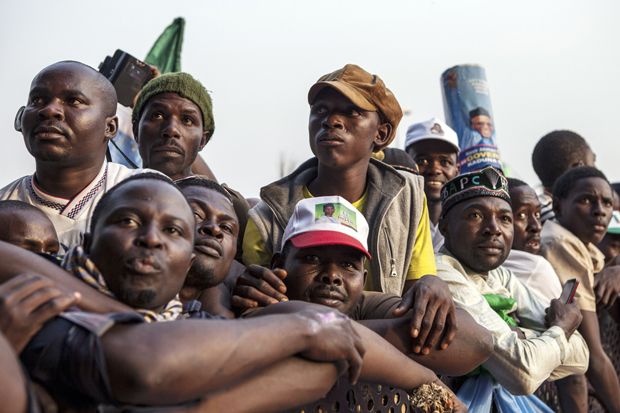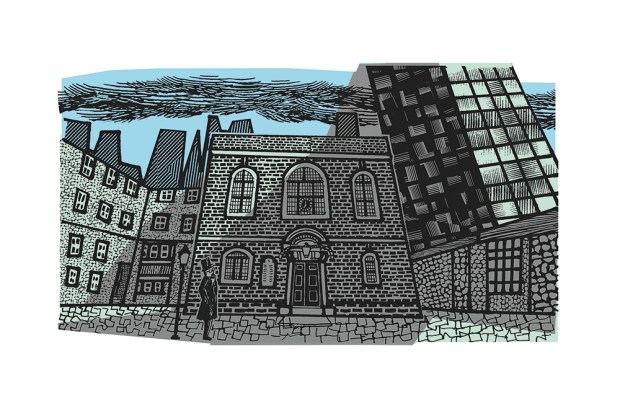Abuja was eerily quiet when I arrived. The capital of Nigeria is normally bustling, but that morning the wide boulevards were empty. The red dust was undisturbed; the call to prayer echoed through the city like the sad lament of the lonely. There is an election approaching, and a lot of people take that as their cue to leave the country. You’ll find much of Nigeria’s ruling class in the Harrods food hall at this time.
Although Abuja is far wealthier and more stable than most of Nigeria, its problems are representative of a country on the brink of disaster. Construction of the capital began in the 1970s, its layout heavily influenced by Milton Keynes. Today it is a mix of grand designs and organisational failure: my tour of the Ministry of Power was complicated by a power cut. Everywhere there are soldiers; every wall is laced with barbed wire to keep criminals and Islamists at bay. The government calculates that if the fanatics who control north-eastern Nigeria head south, then at least the army should be sure of holding Abuja. For it is entirely possible that when next month’s elections are over and the votes have been forged, the country could fall apart. It is a nation divided against itself, barely held together by a political system that many Nigerians regard as a joke. But while things are bad, the country is experimenting with reforms that offer a model for the rest of Africa. Its redemption lies in capitalism.
Nigeria is the largest economy in Africa, thanks to oil; Lagos city, down south, is experiencing a golden age. Nigerians can get stuff done: Ebola isn’t a significant threat here because the country acted so efficiently. The people are friendly and natural entrepreneurs. The problem is that government competes with family and tribal loyalties that run deep. The Nigeria to which Britain gifted independence amounted to at least seven countries in one. In 1967, the southeastern part tried to secede — triggering the bloodthirsty Biafran war. If there have been no similar secessions until now, it is largely because that period of Nigerian history was so traumatic.
But the instability of the present is shown in the risk that a hitherto stable government might lose an election. President Goodluck Jonathan, a man with a passion for fedoras, and his running mate Namadi Sambo governed at a time when oil was above $110 a barrel — and achieved next to nothing. Now that oil is around $50 a barrel, patronage and ‘gifts’ are no longer enough to hold things together. Jonathan’s posters say that ‘Nigerians demand continuity’, which is as farfetched as saying that chickens demand to spend more time in the company of foxes. The president knows that, which is why he’s embraced economic modernisation. By contrast, you can tell supporters of the opposition because when they meet in the street they greet each other with a cry of ‘Change!’ Their candidate is the 72-year-old Muslim general Muhammadu Buhari, a former military dictator with a reputation for discipline.
Issue number one is security. The terrorist group Boko Haram now controls the northeast of the country and keeps the rest of Nigeria in terror. They used to target soldiers. Now they go for civilians. I saw a marketplace where a bomb went off a few months ago, killing dozens: the streets were littered, say the locals, with arms, legs and heads. It all happened next door to a mosque. Boko Haram is just as concerned with punishing Muslims for what it regards as theological deviation as it is with persecuting Christians. It recruits by kidnapping children and brainwashing them. The 200 Christian girls taken last year were most likely regarded as potential wives or even suicide bombers. Jonathan’s government promised to recapture the children but failed.
I’m told in whispers that rebels get their equipment from government soldiers selling it for food. Conspiracy theories abound that the administration benefits from the civil war continuing because it means that opposition voters in the northeast are disenfranchised. Certainly, it is odd that the army has been so much more active and successful at fighting terrorism in some places than others.
Issue number two is corruption. While the vast majority of the country is dirt poor and visibly malnourished, a few get rich out of exploiting contacts and demanding kickbacks. That’s apparent in the army. There the elite officers live like kings, sending their children to English public schools. A junior officer, meanwhile, makes around £350 a month, or less, to fight fanatics. Support is growing for Buhari and his promise to clean things up. Whoever loses, they’ll contest the result in courts and the streets. These are conditions that classically support a military coup.
In short, Nigeria has to be delivered from its own government. Happily, that’s starting to happen. One rare economic achievement has been the privatisation of the telecommunications industry — its success is obvious in the fact that everyone in Abuja has a mobile phone and millions are on Facebook. Now the government has sold off its power supply, and it’s done so with the help of the UK.
We usually think of international development as charity: Bono laying wells in the desert. But in Nigeria, the Department for International Development has been far more flexible and savvy. For example, it’s persuaded the northern city of Karno to reduce the number of local taxes from 200 to 17. The Nigeria Infrastructure Advisory Facility programme has also guided the largest privatisation in African history in the power sector. As the government moves from being a supplier of power to a regulator, so the investment switches from taxes that are misappropriated and misspent to private money that — by dint of being someone’s personal fortune — is far more likely to be well managed. There is little discipline in a Nigerian bureaucracy rife with corruption. But there is discipline in the marketplace, where competition leads to ruthless efficiency, and failure to bankruptcy.
The frustrating thing is that British business isn’t exploiting the opportunities it has opened up. Nigerians don’t understand why the UK government helps to liberate their economy, yet it’s the Americans and Chinese who offer the investment. Sometimes, perhaps, the Brits are a little too nice for their own good. We are encouraging the growth of solar energy in the north through programmes like Solar Nigeria — a brilliant idea because one thing they have no shortage of is sunshine. But as someone complained to me, the British tend to sell the idea as an environmental thing and most Nigerians couldn’t care less about rescuing the polar bear. They would jump at the project if they were convinced that it would make them money.
Britain has to get this right, if only for selfish reasons. Diplomatic sources estimates that some 2.5 million Nigerians would have a right of residence in the UK in the event of a coup or war. But also we owe it to those Nigerians who suffer under the present system. It is possible after only a few days in Abuja to get very angry indeed. Angry at the naked corruption of traffic police who take advantage of the lack of lighting to leap out of the dark and shake down a bribe. Angry at the disparity between enormous officials and skinny children picking through bins. Angry too with an upper class that seems to approach life with a deadening irony — as if the whole enterprise is some cosmic joke from which only they profit.
But one can’t let one’s fury boil because it’s already too darned hot and one has to have faith in the capacity of people to survive. On a Sunday morning, women in elegant dresses walk through the middle of the oncoming traffic towards church, oblivious to the danger around them. The average Nigerian’s sheer strength of will is -astonishing.
Got something to add? Join the discussion and comment below.
Get 10 issues for just $10
Subscribe to The Spectator Australia today for the next 10 magazine issues, plus full online access, for just $10.
Tim Stanley was in Nigeria as a guest of Adam Smith International.
You might disagree with half of it, but you’ll enjoy reading all of it. Try your first month for free, then just $2 a week for the remainder of your first year.














Comments
Don't miss out
Join the conversation with other Spectator Australia readers. Subscribe to leave a comment.
SUBSCRIBEAlready a subscriber? Log in